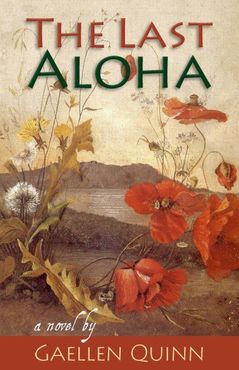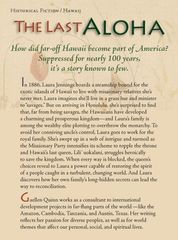Why I wrote The Last Aloha
Since the mid-1960s, I’ve traveled to Hawaii numerous times. I was vaguely aware that Honolulu had “the only royal palace on American soil,” and that there was a “King Street,” and a “Royal Hawaiian Hotel,” and other places named for Hawaiian royalty. But in those days, I never heard a discussion or saw any books about the royal Hawaiians.
Like many others, I read James Michener’s, Hawaii, and learned about the natural history of the islands, the pre-contact period before Captain Cook, the missionary period, the immigration of the Chinese, Japanese, Portuguese and others, and the territorial period. But Michener’s book, first published in 1959 when Hawaii became a state, skips over the period of the monarchy completely. Michener was a magnanimous man, a thorough researcher and totally against racial prejudice, as his book and the subsequent play, South Pacific, attest.
How could he miss this important era of Hawaiian history? From my research, I believe he knew little or nothing about it. Information on this period was suppressed by missionary descendents who kept documents in private collections and controlled the writing and dispensing of “official” Hawaiian history well into the 1960s.
A DIFFERENT STORY OF HAWAII
Some years ago, my brother married a Hawaiian woman and I began to hear a different story of Hawaii. My sister-in-law was raised by her grandmother in the old Hawaiian way. Her ancestors were alii, from the royal class. They were the “navigators” who had sailed the great canoes up from southern Polynesia a thousand years ago. (Her ancestors have “star” names and her family still has a stone icon that sat at the front of one of those ancient sailing canoes.) In the 19th century, her family was involved in many of the momentous happenings during the time that the monarchy was overthrown. I asked her and my brother for material that might shed light on the period of the Hawaiian monarchs. They directed me to a few books, first published in the 1980s and I was stunned to learn facts I’d never heard in all my travels to Hawaii.
The royal Hawaiians had developed a constitutional monarchy with democratic elections. Over 90% of Hawaiians could read and write. King Kalakaua, the last king of Hawaii, was the first monarch ever to circumnavigate the globe (and was received with royal honors in the courts of Asia and Europe, including an audience with the Pope in Rome, Queen Victoria and the President of the United States). Queen Victoria was godmother to one of Hawaii’s crown princes and Queen Kapiolani and Princess Lili’uokalani, who became the last queen of Hawaii, attended Queen Victoria’s Jubilee celebration as a specially invited guests. Hawaiian monarchs were accomplished writers, musicians and statesmen, entertaining such luminaries as Robert Louis Stevenson and the dignitaries and ambassadors of many nations.
WHY HAD I NEVER HEARD ANY OF THIS BEFORE?
Then I learned of the intrigue of the descendents of missionary families who’d left the mission field and gone into business. They’d become extravagantly wealthy under the reign of the Hawaiian sovereigns, but considered themselves better suited to rule. In the 19th century, a number of them were educated at Columbia University where the political science department was based on the philosophy of Social Darwinism–-that only the Teutonic races were fit for self-rule. The machinations of these missionary descendents ultimately toppled the throne and they took over Hawaii.
While researching the era, I had the image of a lavish 19th century period film–-the sort produced by Miramax or Merchant Ivory–-but instead of being set in England or Europe, the caste of characters would be a mix of royal Hawaiians, Americans and adventurers of many nations, living in the exotic culture of a charming island kingdom. It struck me that a book set in this period could evoke a fascinating, vanished world.
But what finally impelled me to write the book was the story of Queen Lili’uokalani’s tragic struggle to save the Hawaiian kingdom. When every way was blocked, she made profound choices which, I believe, preserved the spirit of aloha in the islands. Hawaii is a beautiful place, but there are many beautiful places in the world. Hawaii has a special spirit and almost anyone who goes there will confirm it. The Last Aloha shows there are powers apart from political and material powers that can restore the human spirit in a turbulent world.

